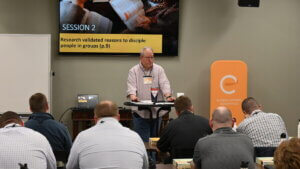In one of my first meetings with the educational leaders of a church I served, I made the comment, “There are no sacred cows.” Everyone in the room agreed, Amened, and approved. A couple of months later as I began speaking about some outdated practices and programs, my words were met with, well let’s say, not so positive stares and comments. People’s sacred cows were coming to light and they weren’t ready to give them up.
When you revise the methods or furnishings (changes) of a church you are in essence trampling sacred memories. What seemed like necessary changes to me were not only sacred cows, they were decades of the familiar, comfort, and religious security of these church members. To these longtime members, I was the new kid (in my forties), the change agent, and that did not bode well.
Bringing about change is not only programmatic. The changes you suggest, as good and godly as they might be, can sometimes be very personal to others. I have written in prior posts about understanding your Emotion Quotient (EQ). Just as every person has an Intelligence Quotient (IQ), so everyone has an EQ as well. Twenty years later in life, I realize the importance of not only knowing my own EQ but also understanding the EQ of those my requests and suggestions will affect.
The year 2020 has certainly brought disruption into every life. The church has faced great disruption and necessary change. Those changes are not over yet. They will continue for some time as we maneuver through the weeks, months, and years ahead. Pastors and other church leaders are deliberating and making decisions on issues they never would have dreamed of twelve months ago.
As each next step is considered in every church a multitude of factors must be considered. Speaking with an Associate Pastor and friend recently I was reminded of EQ. He did not use that term, but he certainly was referring to it. He said to help their congregation through all the disruptions and adjustments, their church staff was not using the word change. Instead of helping their people deal with change, they have adopted a grief process. They are walking with their members as they grieve the loss of what once was.
The changes of the church brought on by 2020 have and will continue to take an emotional toll on churchgoers. This staff has challenged themselves to walk with their members through the stages of grief during this time. Your church members have lost a great deal of what they have known for years, even decades.
The emotional state of some breaks down quicker than others. Wouldn’t we all farewell to consider the EQ of those we serve and those who serve us? Considering the losses, approaching people from a position of grief assistance could certainly aid in the emotional and spiritual state of mind – for our members and leaders. What can you begin today that will enable you to assist others in walking through the grief stages from losses in 2020?









 by Dogwood
by Dogwood